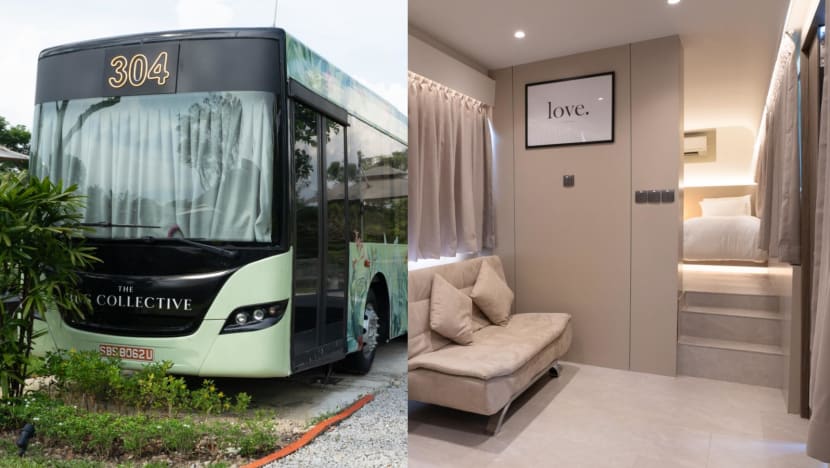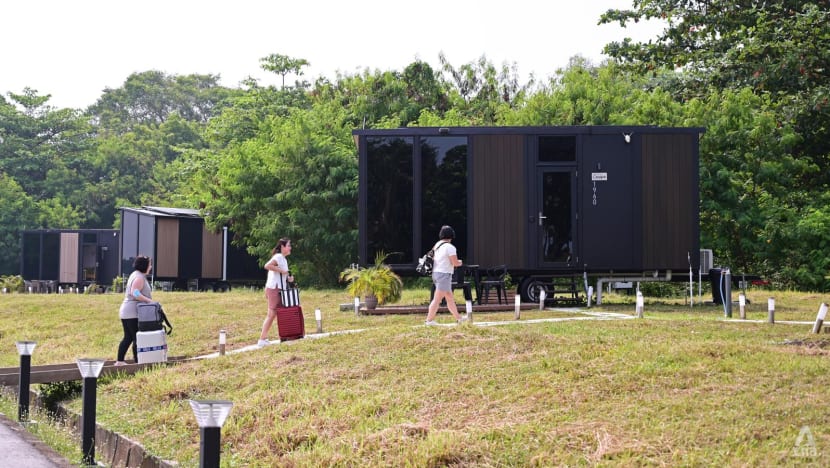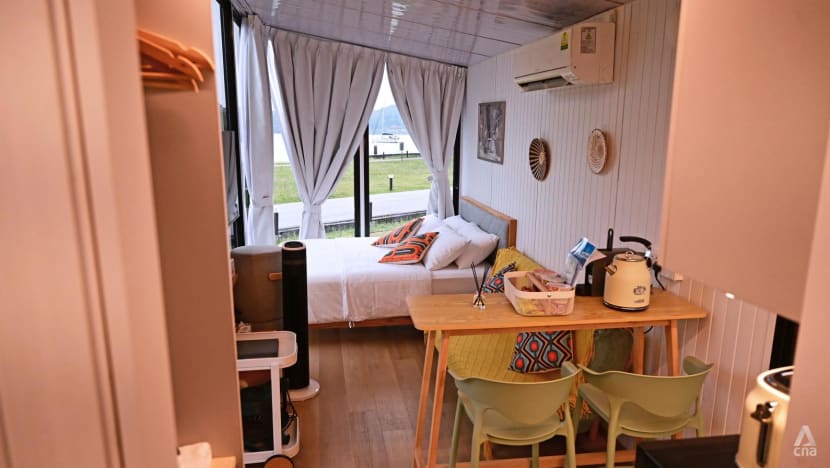Commentary: Would you pay top dollar for a staycation in an upcycled bus or shipping container?
Escaping from it all is a rare enough commodity in Singapore that may well be worth the premium, says writer Desiree Koh.

The exterior (left) and interior (right) of one of the guest rooms at The Bus Collective. (Photos: The Bus Collective)

This audio is generated by an AI tool.
SINGAPORE: For six teenage years, I got on the public bus at 6am for a 70-minute ride to school. I had this trek down to a comfortable formula: Fire up the Walkman, settle into my usual spot on the last row of the double decker’s first level so my legs had ample space to unfurl, then gently lean about 120 degrees to the left where there was a particular nook that perfectly cradled my head.
This set-up made for a satisfying snooze and I’d arrive at assembly refreshed and ready. On that bus 65, would I have liked a king-sized bed, fully stocked complimentary minibar, fluffy bathrobe and blackout curtains?
Guests can now enjoy that at The Bus Collective. The resort comprises 20 upcycled public buses fitted with rain showers, flatscreen TVs and other luxury amenities.
The buses don't take guests anywhere - but being situated in Changi Village, are within reach of nature trails and hawker food. They are also conserved with the original bus driver seat, steering wheel, dashboard and pedals for atmospheric fun.
When The Bus Collective launched in December 2023, rooms went for S$398 (US$300) per night. But are they worth the price tag?
A NEW TREND OF ECO-FRIENDLY, POP-UP HOTELS
The Bus Collective isn’t the pioneering sustainable hospitality project here. Hospitality group Tiny Pod opened two repurposed 40-ft shipping containers at Haw Par Villa in early 2021, when overseas travel was still a pipe dream due to the pandemic.
Tiny Pod has since set up a branch at one-north, and four duplex suites within Gardens By The Bay.
Meanwhile, operator Big Tiny launched Tiny Away Escape @ Lazarus Island in May 2023. The eco-friendly resort is made up of five "tiny houses" fitted with solar panels and food composters.
Singaporeans seem to welcome these extraordinary staycations. More than 600 people registered for an early bird discount for Tiny Away Escape, while Tiny Pod said the occupancy rate at its one-north and Haw Par Villa locations has remained at 90 per cent over the past few years.
Such concepts, however, have also been met with scepticism. Online commentators wonder if they are flash-in-the-pan gimmicks, noting that some of these hotels can charge up to S$500 per night, comparable to a five-star hotel.
But these new hotels give guests a break from the mad rush for Marina Bay Sands infinity pool access, around-the-clock butler service and breakfast buffet bacchanalia. Those frills come with their own loaded luggage of FOMO (fear of missing out).
Pop-up hotels, having the flexibility to set up shop at heritage and offbeat sites across the island, are also a change of pace from the typical Orchard Road and Central Business District accommodation.
SUSTAINABILITY PART OF THE ETHOS
Sustainability is part of pop-up hotels' ethos, giving guests the chance to experience firsthand how seamless and gratifying eco-living can be. Solar panels, composting, upcycled and repurposed amenities are some of the ways these accommodations leave small carbon footprints.
For Jocelyn Yeo, 47, a two-night stay at Tiny Away Escape @ Lazarus Island for a December school holiday finale with her husband, teenage son and close friends was her first staycation of this genre.
“We loved the tranquil environment and had fun playing on the beach and simply listening to the waves,” she reminisced to me. “We hiked all around Lazarus, Kusu and St John islands, played card games, and leisurely spent hours making and enjoying our own dinners - steamboat one evening, barbecue the other.”
The bigger picture suggests the hospitality industry is finding new ways to be more sustainable. According to Cherine Fok, KPMG director of sustainability services, such projects show how Singapore can transition to a circular economy where materials never become waste, reducing our dependence on raw materials and allowing nature to regenerate.
Tellingly, these hotels were developed in partnership with the Ministry of Trade and Industry, pointing to an eagerness in catalysing inventive new paths in our hospitality sector.


THE COST OF ESCAPING FROM IT ALL
But if pop-up hotels are all about minimal living - and when they are built from upcycled materials - why pay such a high price to stay in them?
Escaping from it all is a rare enough commodity in Singapore that may well be worth the premium. Whether or not it’s a worthwhile investment, at least we have the option. As the meme goes, it’s “cheaper than therapy”.
Twenty-five years ago, I road-tripped the iconic Route 66 spanning half the US with my mum. We spent our nights at historic stops like Arizona’s Wigwam Motel (each room is a tepee with ingeniously designed interiors) and Oklahoma’s Trade Winds Inn where Elvis Presley had his own suite.
These no-frills highway stops didn’t cost much and still exuded the pre-1950s ambiance of their heyday. But their novelty soothed any squabbles and proverbial road bumps bound to pop up after days and thousands of kilometres together in a car running on its last fumes.
Without smartphone and social media distractions, we spent evenings recounting the kitschy Americana, gorgeous sights and diner nosh encountered each day. We learned new things about each other, and forgot and forgave old grudges.
The film-developed photos from that trip are somewhere in some closet, and no one has looked at them in years. But every time we talk about that trip, we remember every detail in technicolor, and our archives of anecdotes enliven dinner parties and connect us with new friends on other travels.
The privilege of a few days in a repurposed bus, an upcycled shipping container or a tiny house can create exactly the same kind of rich, vibrant encounters and memories. They’re aesthetically gorgeous and the surroundings are stunning, but magically, you may not feel the rush to Instagram every moment.
The best part is, no need for a plane ticket to arrive at these hopeful havens. Just an open mind and an adventurous spirit.
Desiree Koh is a freelance writer based in Singapore.

















